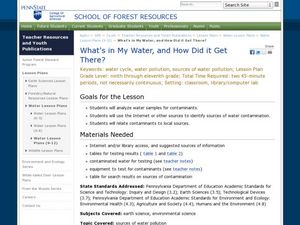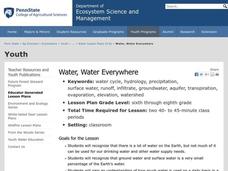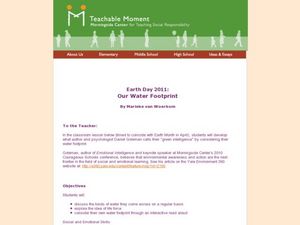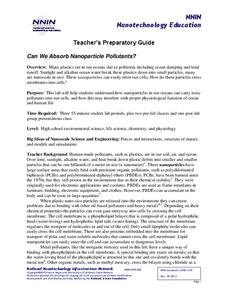Curated OER
Save That Water
Young scholars investigate water conservation. In this environmental lesson, students brainstorm ways they use water and discuss ways to conserve water. Young scholars illustrate and write about their method of water conservation.
Curated OER
Oil + Water + Wildlife = A Real Mess
Students conduct an experiment. In this environmental protection lesson plan, students explore how oil spills affect living organisms in an ecosystem. Students work in groups to complete a lab activity and then discuss their findings.
Curated OER
What's in My Water, and How Did it Get There?
Students analyze water samples to see the contaminants and then use the Internet to find the sources of the contamination. In this investigative water lesson students analyze water and work together to solve the mystery of...
Curated OER
Are You a Water Waster?
Students determine what it means to be water wasters. In this water conservation lesson, students follow the provided procedures to identify how much water is used in their household when people brush their teeth.
Curated OER
Water and Sanitation
Students examine water contamination problems. In this global studies lesson, students compare and contrast water sanitation issues on Malawi, Tanzania, and Ontario. Students propose solutions to the water sanitation problems.
Curated OER
Water, Water Everywhere
Students recognize that all of the water on earth cannot be used for drinking and that the percentage of ground and surface water is a small percentage. In this water instructional activity students identify ways to conserve...
Curated OER
Our Water Footprint
Students discuss the water usage of the world and their own water usage. In this water lesson plan, students read a story about water and discuss different statistics of water usage around the world.
Curated OER
Water Awareness Portfolio Instructions
Students participate in a water awareness portfolio. In this water conservation lesson plan students create a portfolio to help make them aware of current water conditions.
Curated OER
Water Quality Survey
Pupils identify the differences in the water quality of a stream and complete water testing. In this water quality lesson students collect aquatic insects and identify them.
Curated OER
Water Quality Assessment
Students evaluate water quality of different sources. For this water assessment lesson students chemical testing, identify biological factors in the stream, and write a paper on their position of the stream's quality.
Curated OER
Hazardous Chemicals? Not in my Water!
Middle schoolers reflect on the effects of their actions on the environment. In this community service lesson, students investigate the hazardous quality of products within their homes. Student educate their families and communities...
Curated OER
Pond Water Web
Students familiarize themselves with the common organisms that live in a pond and discover their importance in a balanced aquatic habitat as they create food webs. They also investigate how an environmental change affects the habitat as...
Curated OER
Ecological Succession in Pond Water Cultures
Students collect samples of pond water, dried grass, and soil in a jar. They predict the order of ecological succession in their pond water cultures. They compare their expected results with their observed results.
Curated OER
How Texas is Planning To Manage Its Water
Students research water management strategies in Texas. They analyze projected demand for water in the year 2050, interpret graphs and tables and then discuss the data as part of a written report. They research and map the locations of...
Curated OER
Environmental Issues And Energy Alternatives Crossword
In this environmental issues activity, students solve 16 clues focusing on the forms of renewable and non-renewable energy, global warming and acid rain.
Teach Engineering
Aerogels in Action
Model an oil spill cleanup. An engaging engineering lesson has groups using aerogels to simulate an oil spill cleanup (vegetable oil in water). Along the way, they learn about nanotechnology and hydrophilia/hydrophobia.
Kenan Fellows
The Little Stuff Can Make a Big Difference
Great things come in small packages! What better way to illustrate this point than a week-long look at nanotechnology? Earth science scholars explore water quality issues through lab activities, then research new innovations in nanotech...
Curated OER
Unit 3: Scientific Writing
Write-on! Demonstrate a writing model and support learners as they write an informational essay on a water resource issue of your (or their) choosing. The lesson plan provides a well-scaffolded summative writing...
Curated OER
Environmental Exchange Box
Young scholars examine the characteristics of their own environment and compare them to another region. They prepare a box filled with items and stories about their own region, exchange the box with another class in another region, and...
American College of Sports Medicine
Selecting and Effectively Using Hydration for Fitness
How much water does your body lose during exercise? How much should you hydrate during and after exercise? Address the importance of hydration with your young athletes using this informative handout.
Southwest Florida Water Management District
WaterWeb - Conservation and Water Supply
If 71% of our planet is covered with water, why do we need to bother conserving water? Find out with these activities designed for middle and high school environmental scientists. From reading articles to solving crossword puzzles, to...
National Nanotechnology Infrastructure Network
Can We Absorb Nanoparticle Pollutants?
Just because we can't see it doesn't mean it isn't there! A growing concern for environmental scientists is toxic nanoparticles in our air and water. Young scholars conduct an experiment to demonstrate how these particles can cross our...
College Board
2009 AP® Environmental Science Free-Response Questions
How do genetically modified crops affect agricultural practices? This is one of four environmental questions scholars respond to in an AP® test prep resource. Other topics include methane digesters, water runoff, and nitrogen-based...
College Board
2002 AP® Environmental Science Free-Response Questions
Are electric motors all they're cracked up to be? Scholars take a stance and use their knowledge to discuss the benefits and disadvantages of the motor as the first question in a series of four. The questions that follow ask about other...























